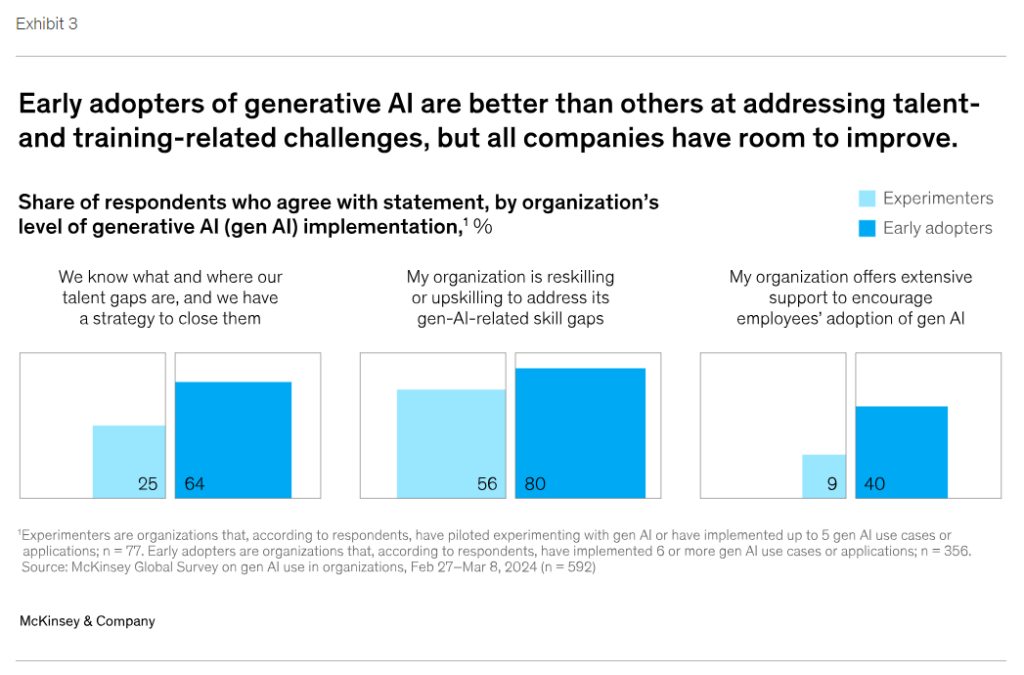After almost two years of debate, the conclusion is clear: generative AI is here to stay, and it brings an enormous amount of business potential with it.
We’ve already seen a rapid surge in gen AI-driven innovation, which promises to accelerate automation and improve productivity, effectiveness and even workplace morale.
According to industry experts, companies that fail to act and adapt now are likely to find it difficult to catch up in the future. Despite all of the hype, most companies have yet to scratch the surface of gen AI’s promise. But that hasn’t stopped the workforce forging ahead with AI tool usage.
Employees way ahead of their employers in AI adoption
Harnham’s 2024-25 Data & AI Salary Guide, which benchmarks salaries in the industry as well as tracking hiring and workplace trends, found that 61% of all employees use AI in their day-to-day roles – but just 37% of companies have an official AI policy. The report also found that the majority of respondents (68%) viewed AI optimistically and positively.
The most common use of AI, according to the report, was general inspiration and ideas. This was followed by code generation (23%), written content (18%), and data analysis/visualisation (17%). This increasing curiosity and encouragement to experiment is no doubt positive, though some data leaders have noted that there’s no easy-to-prove business case for this employee-driven adoption.
On the other hand, 39% identified AI skills as their organisation’s top skills gap and 34% identified the gen AI rollout in organisations as their prediction for the biggest trend over the next 12 months.
Organisations must understand their talent and skill needs quickly
As the above indicates, gen AI’s implications for high-quality data talent and skill are huge. The technology’s potential to accelerate productivity and transform operational processes will significantly affect the roles and skills needed by companies. According to McKinsey research, half of today’s work activities could be automated between 2030 and 2060.
“That’s incredibly significant and puts a lot of pressure on companies to understand their talent and skill needs quickly,” reports McKinsey. “A gen-AI-based talent transformation isn’t something companies can simply hire their way out of, as it affects the entire organisation and its ways of working.”
With the rapid advancement and widespread accessibility of generative AI, it is essential for organisations to build capabilities across the entire workforce. Employees must adapt to new skills, such as prompt writing, contextualisation, and data-driven decision-making, which are increasingly critical in the data and AI landscape.
While the specific skill sets required may differ between organisations, all must adopt a dynamic and continuous approach to talent development, aligned with their evolving operating models. Building these skills is not a one-time effort but an ongoing process that ensures the workforce remains competitive and capable of leveraging AI effectively.
As generative AI and automation reshape roles, employees will need to complement these technologies with strong cognitive abilities, strategic thinking, and social and emotional intelligence to tackle more complex tasks. These human skills will become crucial in bridging the gap between automation and the uniquely human aspects of work.
Regardless of where an organisation stands on its generative AI journey, the time to act is now. While there are a myriad of other internal and external challenges to a business’ AI implementation, many employees have already begun exploring AI tools on their own, eager to find ways to integrate them into their daily workflows. This proactive approach presents a unique opportunity for companies.
By embracing this momentum, organisations can accelerate their AI adoption and upskilling efforts. They can overcome potential barriers to AI integration and get ahead of the curve when it comes to developing the necessary talent. Capitalising on employees’ enthusiasm for AI can significantly enhance the speed and effectiveness of transformation across the business.
Learn more about Rockborne’s data & AI training courses
Download Harnham’s 2024-25 Data & AI Salary Guide




